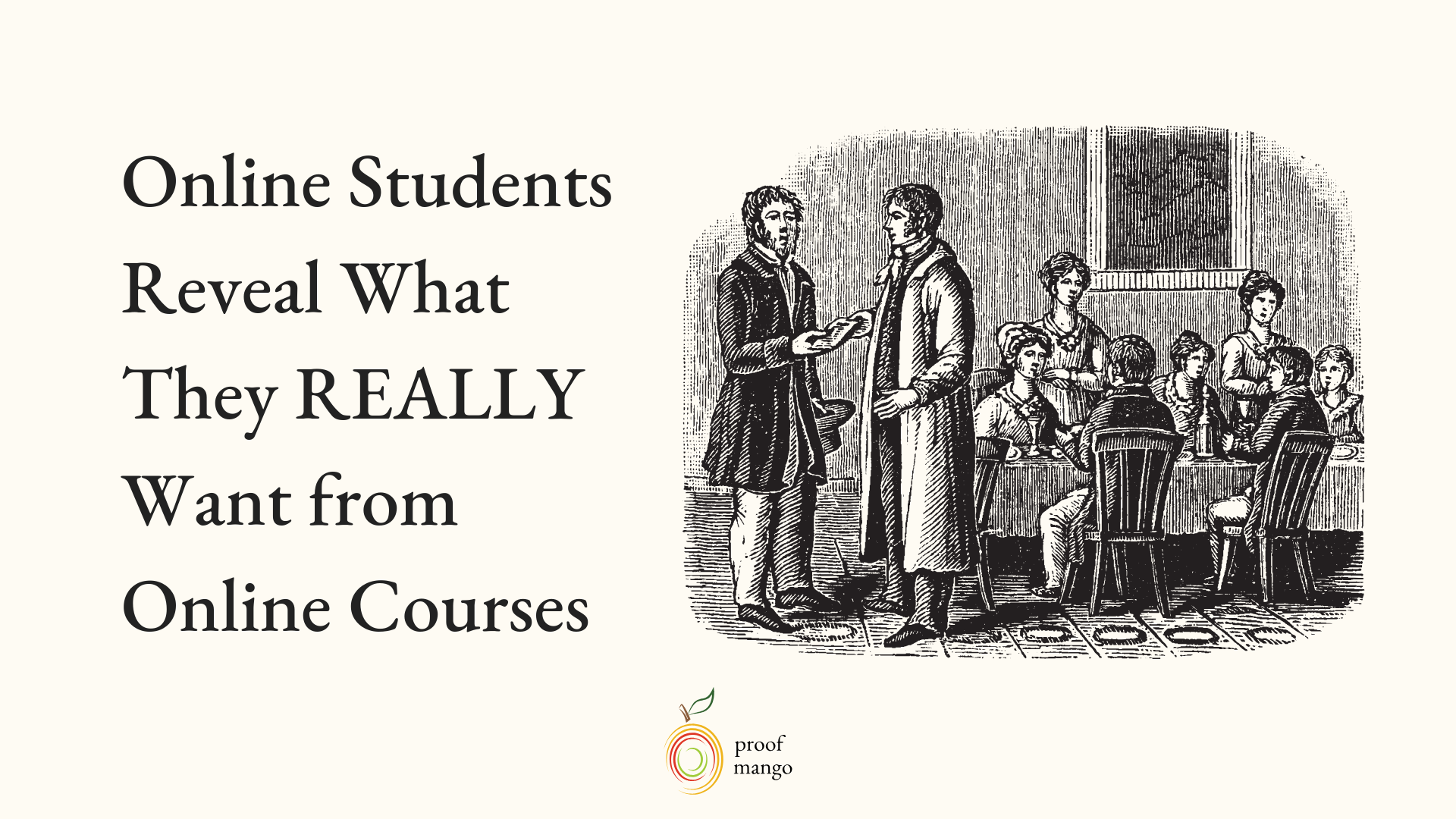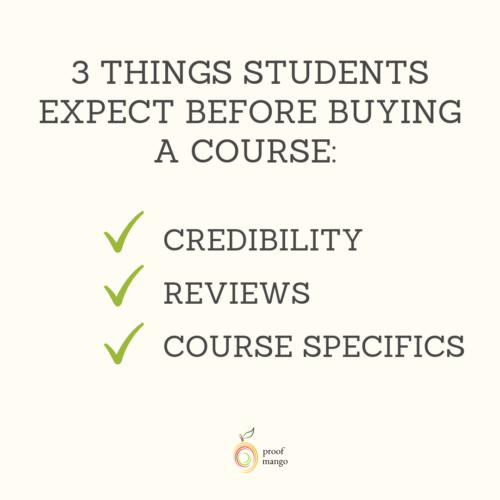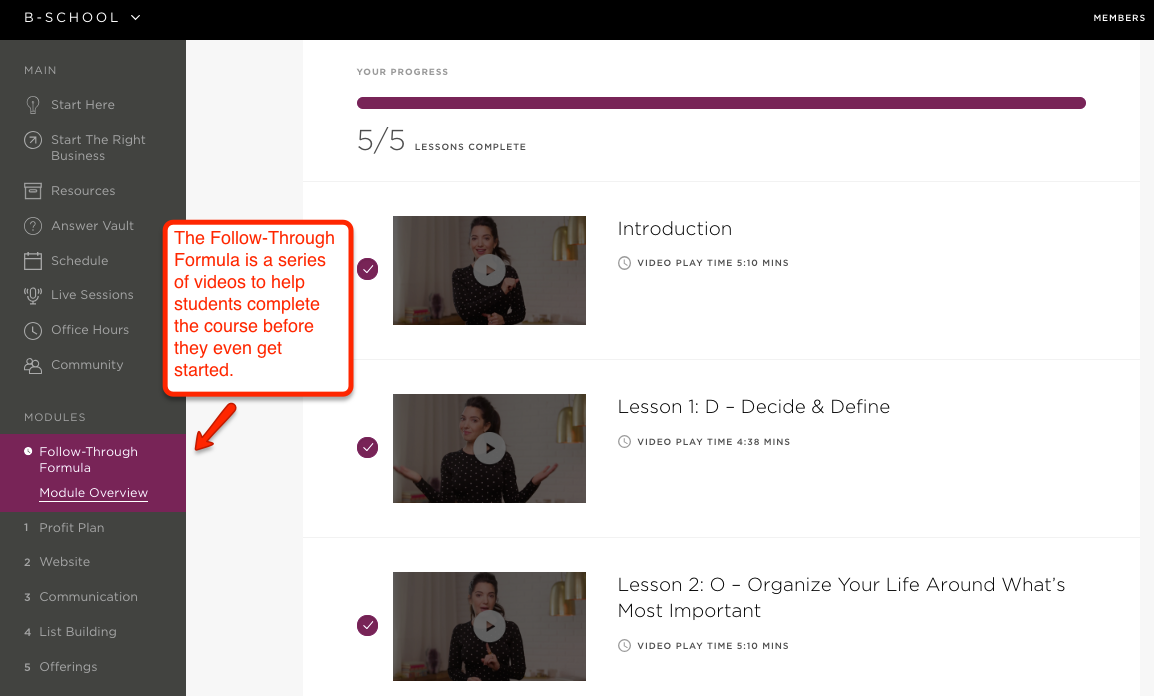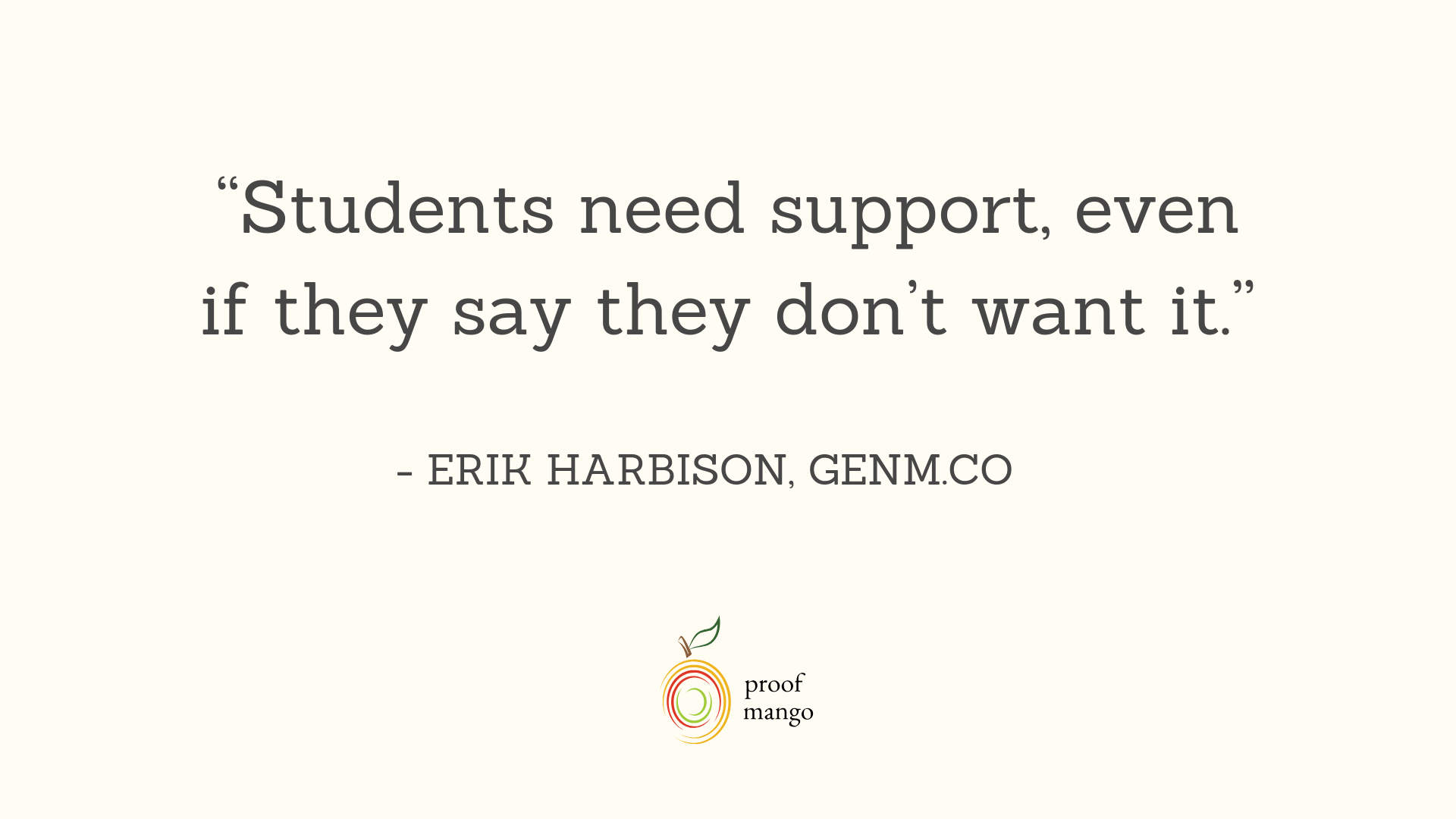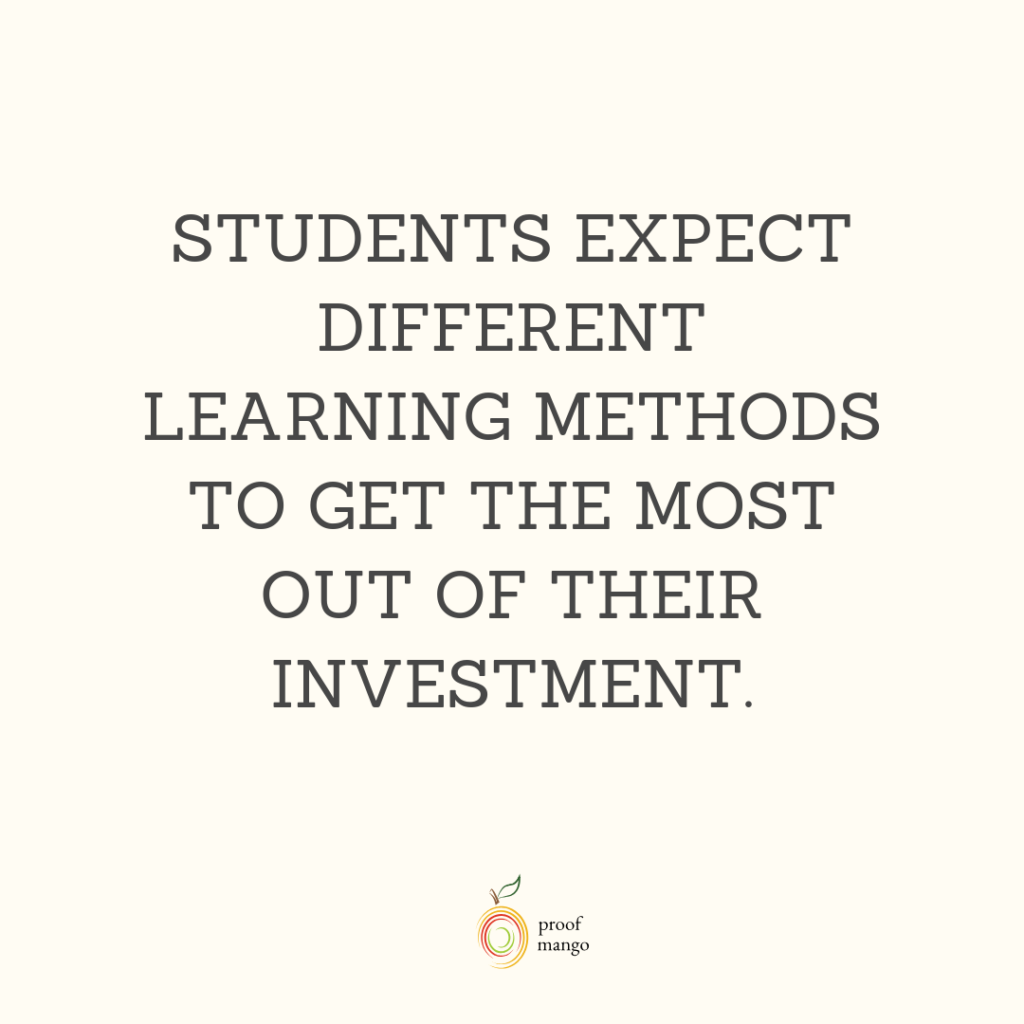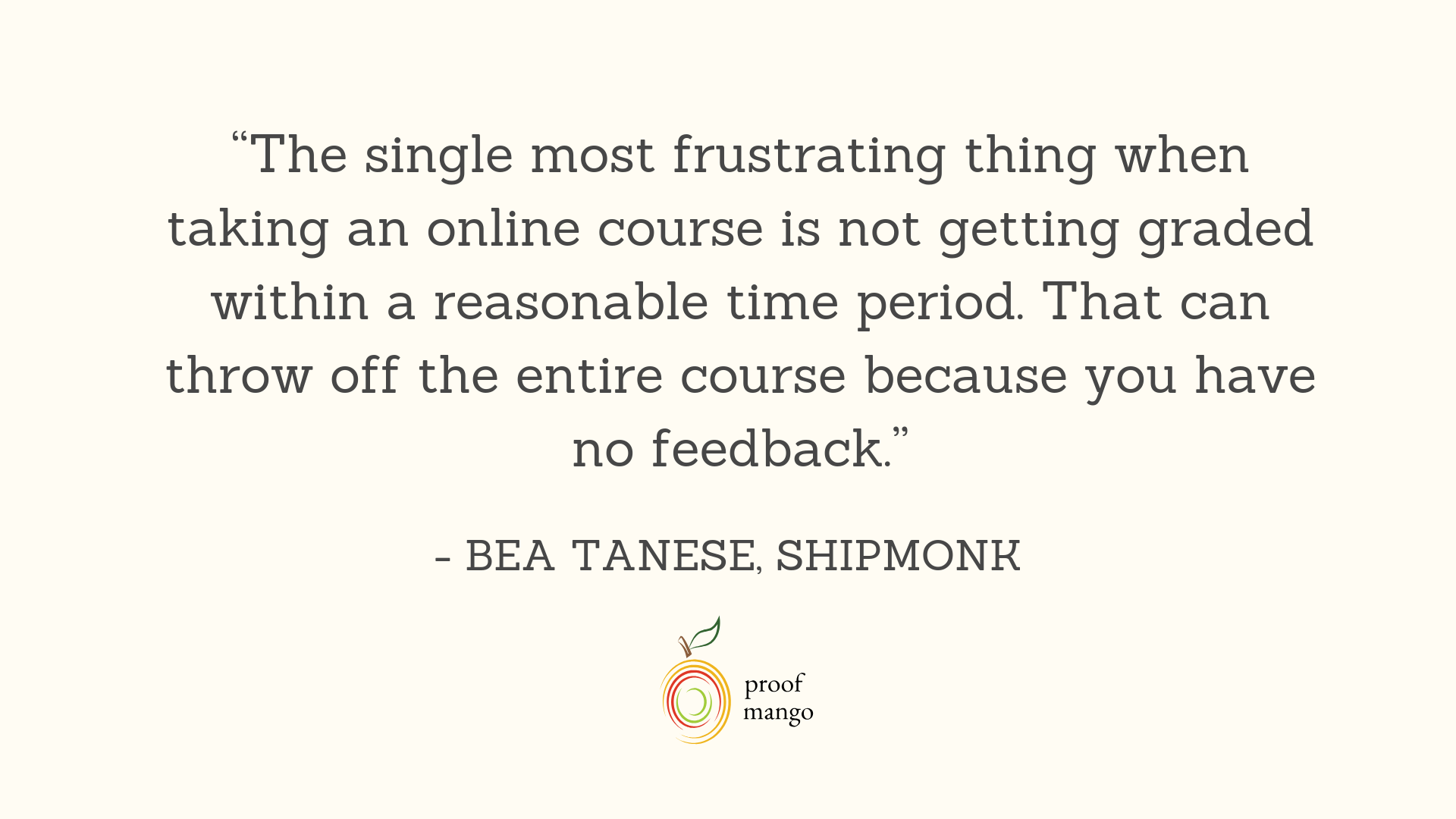Are you meeting your students’ expectations in your online course? We talked to online course students all over the country to figure out what they REALLY wanted from online courses today – and their expectations are high.
You’ll never know what your students expect from you unless you ask them — and that’s exactly what we did.
We connected with online course students from all over the country and got first-hand knowledge about what they REALLY wanted from online courses at the following stages:
- Prior to buying a course
- Right after buying a course
- During a course
- After finishing a course
Below are real expectations from students we spoke to who buy online courses regularly.
With this kind of information, you can deliver a near-flawless learning journey for your students. So what will you do with it?
Let’s find out.
Student Expectations Prior to Buying an Online Course
Prior to buying an online course, there’s a lot of work to be done in the mind of a student.
First, there has to be a need — the need to fill a gap in their career, relationship, or personal life.
Once this need is identified, they’re on the hunt. They search platforms like Udemy, LinkedIn Learning, or even just Google. This is where any keyword research you did for your course title would help, by the way.
And when they do stumble upon a course that looks like what they need, they start digging for things like price and time commitment.
But more importantly, we uncovered three things that students pay special attention to before buying an online course: credibility, reviews, and course specifics.
3 Things that Matter to Students Before Buying a Course
Credibility on the part of the teacher was what nearly half the people we talked to expected from an online course.
Bernice Quek, head writer at Bumble Scoop, has taken courses by Ahrefs and Backlinko. Before signing up for an online course, she first reads reviews from students and the portfolio of the course instructor.
Of the course author, she said, “I would expect him or her to be a respected expert in the field.”
John Frigo, digital marketing lead at Hemp Sacred, agrees. He’s created online courses in the past and regularly subscribes to online memberships that offer unlimited courses.
He said, “I'd like to hear something about the teacher’s background and why I should listen to them, and why they have the authority to teach the course.”
Often times you’ll hear people say you don’t need to be an expert to teach an online course. I believe this to be true, but given the expectations of students these days, you need to be expert enough.
Keep in mind though, that “expert enough” doesn’t mean you have to have all of the answers.
“Students want to learn,” says Erik Harbison, an online teacher at GenM. “And they want to learn from someone that is credible. That doesn't mean the instructor will have all the answers, but it should be someone that is seeking to challenge and push each student out of their respective comfort zones.”
At the same time, be specific about what your course is about.
People don’t want to buy something if they don’t know exactly what they’re getting.
Frigo adds, “I like when there's plenty of information and context given upfront about what the course is about. In the past, I've bought expensive courses where the sales pitch was relatively vague, only to buy the course and realize the course material isn't even applicable to me.”
When you’re marketing your course, don’t forget to talk about the specifics of what students are getting and who the course is for.
Without this information, you could mislead people into enrolling for something they don’t want and you won’t get the 3 R’s that signify a successful course: raving fans, reviews, or repeat buyers.
Instead, you run the risk of getting two R’s nobody wants — a refund request.
What Students Expect Right After Buying an Online Course
Right after someone buys your course is the pivotal time to exceed their expectations. Don’t just send them a login and assume they’ve got it from there.
Harbison says good online course experiences start with setting clear expectations up front. Students expect to learn what’s required of them, what type of commitment they’re getting into, and how they can get support.
“Once actually enrolled in a course, I’d like to know what I’m going to learn,” says Frigo. “I’d also like to hear a bit about their teaching style and how I can get the most out of the course.”
Usually, there is a “Welcome” area in most courses that really rolls out the red carpet for new students.
For example, in B-School, Marie Forleo offers a tour of the course platform, an introductory welcome video, a mini pre-requisite course for beginners, and a series of videos called the “follow-through formula” to help people get through the course.
These are a bigger deal than you think.
Lewis Thomas, owner at Host Sorter, didn’t take online courses for a long time because he thought most were unprofessional and unorganized.
However, it was an informative “welcome” guide in an SEO course he took that changed his mind about them.
“For a long time I always veered away from online courses,” he said. “However, after being recommended by a friend to an online SEO course, I was extremely glad I took it. I wasn't sure what to expect, but once I signed up, I was welcomed with a guide on the best way to use the course.”
When people are welcomed into an online course with the resources they need to get the most out of your course, they feel supported.
You separate yourself from the cash-grab courses out there that lack good structure and support. And while there’s a lot of advice on how to market your course, you should focus equal attention on making your course the best it can possibly be.
Remember, when you’re the best, you’re in the least crowded market.
What Students Expect While Taking an Online Course
If you thought expectations from students were high prior to enrolling in your course, they only get higher when they’re actually in your course.
We’ve broken up some of these online course expectations by category for ease of reading. Here’s what students expect during an online course.
Highly Supportive Instructors
“Students need support, even if they say they don’t want it,” says Harbison of GenM.
Not all of your students will need your support, but they will feel supported knowing it’s there.
Jeremy Rose of Certa Hosting has taken courses in foreign languages and programming, and his expectations are held at the same level as a course from a brick-and-mortar institution.
He expects “…that the instructors are approachable and able to help when people get stuck in the curriculum.”
Bea Tanese, PR specialist at ShipMonk, confirms this.
“When taking online courses, I expect to get the same quality experience that students at a brick-and-mortar school would have.”
A few students we talked to confirmed it was frustrating when they couldn’t ask quick questions about the material they were learning. And while it seems like a no-brainer that you’d be there for your students, it’s not a high priority for most.
I’d attribute this to marketers who tout online courses as a quick-fix to reclaiming their time and boosting their income.
Sure, online courses are a great way to step back from one-on-one client work and make more money. And while that may be the reason you start down the online course path, that’s not the reason that’s going to carry you to success.
A lot of course creators are in for a rude awakening when they realize they can’t be successful without effort. A course is a relationship you build with a student for a greater purpose than passive income — it requires constant attention and support.
Ben Taylor, founder of Homeworking Club, said instructor engagement was crucial for him in an online course.
“I’ve taken some courses where the instructors have failed to make me feel bought into the course. Completing such courses is a struggle, and tends to send me to sleep!”
And what's worse, online course students are savvier than they used to be. They know how saturated the online education industry is. They want to feel like the course creator they buy from isn't just out for their money.
“Unfortunately, courses and digital products have turned into somewhat of a cash grab,” says Frigo of Hemp Sacred. “It’s caused the market to become flooded with low-quality courses taught by people who have no business teaching about topics, but who are just doing it to make a quick buck.”
Get into the mindset of generating changemakers in your industry, rather than generating $5k on your next launch.
Real-World Tasks Students Can Apply
Your students expect to walk away from your course being able to apply your course to their lives. Ask yourself, how can my students implement change from this?
As Brandon Ballweg of ComposeClick, a photography education site, shared, “When I enroll [in a course], I expect to be taught an important skill that will be useful in my life or something that will help me make an income.”
No student enrolls hoping to walk away with a few more nuggets to store temporarily in their brain.
“I want a course that makes sense and can be applied to my professional life and not just sit in theoretical dreamland,” says Harrison Hove, an online master’s student from the University of Missouri.
One of the golden standards of a good course is whether or not students can apply what they’ve learned.
Harbison says, “Online courses should provide so many hands-on experiences that students can transition these learnings seamlessly into their day-to-day lives and roles.”
Can you imagine how many fans you’d have if you did this for your students?
“To make the course more hands-on, it should include applicable tasks so that learners can practise what they’ve just learnt,” adds Quek of Bumble Scoop. “This way, we can remember the concepts and techniques taught better.”
Always make sure your students are doing more than just thinking about something — give them opportunities to actually do what you’re teaching. Give them a way to practice what they’ve learned on other people, or in their own line of work.
Plus, when your students apply what they’ve learned, it gives them an opportunity to discover their own “a-ha” moment. And these are so important in online learning!
When you allow students to discover something new about their potential, ability, or character, you become single-handedly responsible for provoking big changes within them.
Convenience
A mobile-friendly online course experience was a must for a lot of students we talked to, and I feel like that doesn’t need much explanation. If you want students to engage with your course, it needs to be easy to access when they’re looking for something to kill time.
“One thing I look for when enrolling in online courses is convenience,” says Carla Hedland, a former student at GenM. “Honestly, I am very rarely set up at a desk to go through courses. I like having the ability to complete online courses during my morning commute and when I have a few minutes on the run.”
Relatable.
Another online course student mentioned that this was a flaw with their experience in the Teachable platform.
“This has nothing to do with course creators,” says Ballweg of ComposeClick. “But I like to go through courses on my phone, and Teachable’s platform is not very mobile-friendly in my opinion.”
This is definitely something to consider when selecting the best online platform for your students. Are they getting the most convenient experience?
Good Overall Course Quality
I’m not going to lie, you can get away with bad quality in your online course, but do your students really deserve that?
Ben Taylor of Homeworking Club says production value is crucial for him in an online course. Things like good lighting, consistent sound quality, and good spelling and grammar are high on his list (like it is on ours.)
And he wasn’t the only one with this expectation. Ballweg said he prefers real video over voice-over slides in an online course and finds the latter a bit off-putting. He said, “I think if you’re charging hundreds of dollars for a course, real video is more professional and engaging.”
He also finds grammatical errors distracting and disrespectful. “I have no problem with [grammar errors] on a blog that’s providing you with free information. But it’s different when it’s a course that you’ve spent your hard-earned money on.”
I know this puts a lot of pressure on first-time course creators to have near-perfect production value, but it shouldn’t. You don’t need to spend thousands of dollars to have consistent sound quality.
But take the time to make your students comfortable, meaning, make sure they don’t have to strain to see or hear you.
This is one of our routine checks when we review online courses for quality – and it's one of the most important.
Clear, Easy-to-Understand Lessons
Winifred Kriste is the founder of Winifred Kriste Cake, and she’s always looking to up her edible flower-making skills on cakes. When she looks for online courses on this, she expects clear, step-by-step instructions at a comfortable pace.
“Instructions should be clear enough to follow, but flexible enough such that learners are able to put their own twist to their work,” she says.
This is especially important if you’re teaching a skill that is hands-on and requires the student to mimic your exact moves.
When creating clear instruction in your online lessons, we’ve found that students prefer:
- Videos and images over text
- Shorter online lessons that are manageable and easy to follow
- Clear and specific learning outcomes
- Two camera angles (when necessary) for better visualization
Multiple Ways to Learn
We found that students also expect different learning methods to be available since some people learn better through video, and others through text or audio.
They also expect resources like checklists or practice material to be able to apply their learning.
Adding in different formats for learning allows students to engage with the course material in different ways. Some people might learn better with just audio, but they might also want to engage with the slides or the text to help cement their learning.
Catering to different learning styles has become an expectation for students because they want an experience that helps them get the most out of their investment.
Student Expectations After Taking an Online Course
Student transformation is an obvious expectation for students by the end of an online course.
“Every student does expect to have ‘developed' in some way at the end of the course,” says Harbison of GenM. “Whether that is to just learn something, make new connections, trigger a new passion, or even to be more marketable.”
But some students care more about a certification or an exam that tests their knowledge.
“A good way to end off the course is to have a multiple choice examination and certification to prove that learners have completed and passed the course,” says Quek of Bumble Scoop.
Other students just want timely feedback, especially for courses where they’re expecting a grade.
Bea Tanese of ShipMonk adds, “The single most frustrating thing when taking an online course is not getting graded within a reasonable time period. That can throw off the entire course because you have no feedback.”
Harbison from GenM takes the end of a course one step further – he offers students lifetime access to him and his course in case they need a sounding board throughout their careers.
What are you leaving your students with at the end of your course? How do you think they will feel when they’re done with it?
What Else Do Online Students Expect?
This list of student expectations is by no means exhaustive. Every student and online course is different. Some topics are better taught through video, others through audio, and expectations differ from subject to subject.
And you may not be able to tick off every box on your checklist for a great, quality course. But there are a few other things students shared with us that you might want to keep in mind.
Social elements: Many students told us they enjoyed collaborating with other students, especially in language courses where they can practice learning with other students.
Professionalism: Students expect professionalism, and they’re quick to point out things that don’t look professional in a course, like typos or sloppy-looking slides.
Challenges: Students want to be challenged and taken out of their comfort zones, but not overwhelmed. They want to learn how to think differently, and put what they’ve learned into practice.
Organization: An organized course allows students to follow a clear path to learning. It allows them to make connections easier, and gives them confidence that they can make it through the course.
You Know What Online Students Expect – Now What?
Now that you have real insight into what students expect in an online course, how will you make yours better?
You could go through this blog post and make sure you’re adding elements of interaction and feedback, or you could use our course quality checklist below and make sure your students’ expectations are being met.
Lastly, what did you think of some of these student expectations? Did they fall in line with what you expected to hear? Let us know in the comments!

